|
|
|
Sort Order |
|
|
|
Items / Page
|
|
|
|
|
|
|
| Srl | Item |
| 1 |
ID:
063597
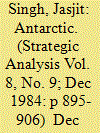

|
|
|
| 2 |
ID:
185848
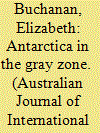

|
|
|
|
|
| Summary/Abstract |
All appears quiet on Australia’s southern front – Antarctica. The continent remains a beacon of cooperation, home to a continued system of international governance and scientific engagement, lauded as a political win from the depths of the Cold War. Beneath the surface, however, this article argues that strategic competition is now building. In Antarctica, this competition takes the form of gray zone activities. This article argues that the proliferation of gray zone challenges could jeopardize the future of the Antarctic Treaty System (ATS). This article analyses gray zone activity in Antarctica and highlights the growing complexity Australia faces, as Canberra pursues the dual objectives of protecting Australia’s territorial claim to the Australian Antarctic Territory (AAT) and bolstering the ATS.
|
|
|
|
|
|
|
|
|
|
|
|
|
|
|
|
| 3 |
ID:
071558


|
|
|
|
|
| Publication |
2006.
|
| Summary/Abstract |
This article examines the San Francisco Peace Treaty of 1951 and its repercussions on modern international relations. In particular, it focuses on the clause in the Treaty which forced Japan to renounce its claim to Antarctica, together with a number of territories in the Asia-Pacific. Carefully tracing the history of the Treaty, the article shows how its earlier drafts and especially the clause in question were shaped by the political context in which the document was forged. Along the way, it identifies the key players in the Treaty's formulation and the reasons for their respective positions on the renunciative clause.
|
|
|
|
|
|
|
|
|
|
|
|
|
|
|
|
| 4 |
ID:
012319


|
|
|
|
|
| Publication |
June 1997.
|
| Description |
64-70
|
|
|
|
|
|
|
|
|
|
|
|
|
|
|
|
| 5 |
ID:
023376
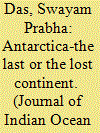

|
|
|
|
|
| Publication |
Aug 2002.
|
| Description |
171-187
|
|
|
|
|
|
|
|
|
|
|
|
|
|
|
|
| 6 |
ID:
185846
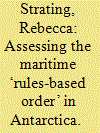

|
|
|
|
|
| Summary/Abstract |
International Relations has become increasingly interested in maritime order as the oceans have emerged as a key site of strategic competition. The South China Sea has become totemic of contests between ‘free’ and ‘closed’ visions of the seas, and is viewed by some as a litmus test for China’s efforts to re-write the ‘rules-based order’ in other maritime domains. This article examines the maritime ‘rules-based order’ in Antarctica, critically examining how and why the United Nations Convention on the Law of the Sea (UNCLOS) matters for the Antarctic region, the Southern Ocean and mechanisms of regional governance. This article contributes to understanding the complexity of maritime order in Antarctica by using Australia’s maritime claims as a case study. Australia is the largest claimant state in Antarctica, with the Australian Antarctic Territory (AAT) constituting 42% of the landmass. This paper examines Australia’s contentious maritime jurisdiction and its ‘normative hedging’ strategy that simultaneously asserts maritime claims and defends collective governance mechanisms, despite the apparent dissonance between these two positions. It argues that the Antarctic region has its own unique ‘rules-based order’ and geographic realities that complicate cross-regional comparisons, and that even so-called ‘like-minded’ states interpret maritime rules in different ways.
|
|
|
|
|
|
|
|
|
|
|
|
|
|
|
|
| 7 |
ID:
124758
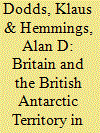

|
|
|
|
|
| Publication |
2013.
|
| Summary/Abstract |
Britain's contemporary and future relationship with the British Antarctic Territory and the wider region is the subject matter of this article. In the aftermath of the ill-fated plans for a merger of British Antarctic Survey (BAS) and the National Oceanography Centre, it is timely to ask how the UK projects influence and secures its scientific, resource and strategic interests. The contemporary Antarctic is increasingly characterized by tension over resource management and conservation politics as Antarctic Treaty parties disagree, both in private and public, over the purpose of legal instruments and the regulation of activities such as fishing and marine conservation. While we do not predict the collapse of the Antarctic Treaty System (ATS), our analysis suggests that the effectiveness and legitimacy of the ATS is increasingly under challenge. The United Kingdom's position as a claimant state and original signatory to the Antarctic Treaty is complicated by the presence of counter-claimants (Argentina and Chile) and a wider preoccupation with other overseas territories, such as South Georgia and South Sandwich Islands and the Falkland Islands. Polar science, carried out by BAS and other British agents, remains critical not only for maintaining the UK's 'soft power' but also increasingly for cementing a 'strategic presence' in the Antarctic. The article ends with a cautionary note: scientific excellence is no longer sufficient to guarantee geopolitical/strategic interests and there is growing evidence that claimant and non-claimant states alike are no longer regarding Antarctica as an area that will remain free of intensifying and diversifying resource exploitation.
|
|
|
|
|
|
|
|
|
|
|
|
|
|
|
|
| 8 |
ID:
190708
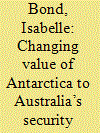

|
|
|
|
|
| Summary/Abstract |
Antarctica is a crucial regulator of the world’s climate, and as environmental security permeates global security, using Antarctic science to better understand climate is becoming increasingly pressing. Although the Australian Government has recognised that climate change poses ‘a current and existential national security’ threat and has acknowledged Antarctica’s importance regarding the earth’s global climate system, the focus of Australia’s intelligence community pertaining to Antarctica currently remains restricted to upholding the military-security and diplomatic goals of the Antarctic Treaty System (ATS). This current focus aims to hedge against the possibility of conflict on, or over, the frozen continent via ‘working the ATS’, however, this paper argues that Antarctic climate science holds a greater capacity to deliver security outcomes for Australia. Antarctic climate science offers opportunities regarding intelligence for Antarctica, that is, securing Australia’s Antarctic interests, as well as regarding intelligence from Antarctica; by enhancing natural disaster preparedness, bolstering broader strategic planning, as well as furthering diplomacy and the legitimisation of Australia’s leadership on, and over, the frozen continent. It is recommended that the Commonwealth Government establish a climate intelligence working group to ensure the utility of climate science to security and intelligence is realised.
|
|
|
|
|
|
|
|
|
|
|
|
|
|
|
|
| 9 |
ID:
098867
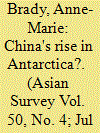

|
|
|
|
|
| Publication |
2010.
|
| Summary/Abstract |
China has begun a new phase in its Antarctic engagement. Beijing has dramatically increased Chinese scientific activities on the frozen continent and is looking to take on more of a leadership role there. This paper draws connections between China's expanded Antarctic program and debates on its foreign and domestic policies.
|
|
|
|
|
|
|
|
|
|
|
|
|
|
|
|
| 10 |
ID:
180583
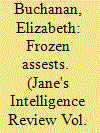

|
|
|
| 11 |
ID:
144320


|
|
|
|
|
| Summary/Abstract |
The governance of Antarctica has re-emerged as a geopolitical issue in the past decade due to the increased presence of China, India and Russia; the continent's importance in understanding global climate change; and its economic potential as a source of marine, genetic and mineral resources. This article examines the challenges for the Antarctic Treaty System (ATS) in this context and the consequences for Australia's foreign policy in its dual role as both a territorial claimant and supporter of ATS norms of cooperative science and environmental protection. The central argument is that Antarctic ‘bifocalism’ is under pressure as increased commercial activity and problematic jurisdictional interfaces with other regimes create difficult regulatory challenges for the ATS and encourage assertions of sovereignty that cannot be resolved within the existing regime. Consequently, the author argues that it is vitally important for Australia to preserve the legitimacy of the ATS through a policy framework of ‘strategic denial’ that aims to prevent all states from acquiring sovereignty over Antarctic territory. Australia should therefore reject recent proposals to securitise Antarctic policy or pursue World Heritage listing because they involve assertions of sovereignty that risk fracturing the ATS and thus compromise Australia's enduring interest in keeping Antarctica as ‘a continent of international cooperation and peace’.
|
|
|
|
|
|
|
|
|
|
|
|
|
|
|
|
| 12 |
ID:
181169
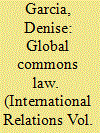

|
|
|
|
|
| Summary/Abstract |
The Global Commons – the high seas and the seabed, Antarctica, the atmosphere (including the ozone layer and the climate system), and outer space – have a distinctive status in international relations because these domains play a vital role in ensuring humankind’s survival, the subsistence of the planet, and the intergenerational custodianship of the human heritage. I call global commons law an ‘uncommon’ realm within international law that is composed of principles and practices that dovetail with treaties aimed at protecting humankind. These laws have an atypical purpose and are characterized by a commonality of interests based on the view that safeguarding these domains is in the interests of developing and developed countries alike, with scientists, activists, and international institutions jointly having a convening power to maintain peace. To elaborate on the impact and implications of the global commons law, I explain three of its functions: guardianship of future generations; creation of a comity for peace and peaceful settlement of disputes; and setting norms as the foundation for peaceful relations. These norms in turn have four key objectives: they provide common ground for peace and cooperation; ensure equity between rich and poor countries; create a forum for equitable burden-sharing; and prevent future harm. The Global Commons face threats – melting ice caps, greenhouse gases, and overfishing – that imperil the survival of humanity. This is then the moment to update and strengthen the mechanisms of global commons law.
|
|
|
|
|
|
|
|
|
|
|
|
|
|
|
|
| 13 |
ID:
140914
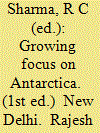

|
|
|
|
|
| Edition |
1st ed.
|
| Publication |
New Delhi, Rajesh Publications, 1986.
|
| Description |
xxxii, 286p.: photographshbk
|
|
|
|
|
|
|
|
|
|
|
|
Copies: C:1/I:0,R:0,Q:0
Circulation
| Accession# | Call# | Current Location | Status | Policy | Location |
| 026259 | 989/SHA 026259 | Main | On Shelf | General | |
|
|
|
|
| 14 |
ID:
174520
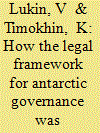

|
|
|
|
|
| Summary/Abstract |
ON DECEMBER 1, 1959, the Antarctic Treaty was signed by Australia, Argentina, Belgium, Great Britain and Northern Ireland, New Zealand, Norway, the Soviet Union, the United States, France, Chile, the Union of South Africa, and Japan. Its founders were the states engaged in scientific research on the sixth continent as part of the 1957-1958 International Geophysical Year (IGY) program. The Antarctic Treaty was the first international legal act to regulate the activities of countries, establish a governance framework and determine the nature of interstate relations in the Southern Polar Region. Drafted at the height of the Cold War, the document became a model for defusing international tension and an example of practical joint effort by states to address global scientific problems. Peace, international cooperation, research, and environmental protection were the fundamental objectives of the Treaty.
|
|
|
|
|
|
|
|
|
|
|
|
|
|
|
|
| 15 |
ID:
063582
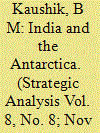

|
|
|
| 16 |
ID:
015109
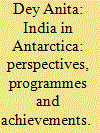

|
|
|
|
|
| Publication |
April-June 1992.
|
| Description |
173-185
|
|
|
|
|
|
|
|
|
|
|
|
|
|
|
|
| 17 |
ID:
185845
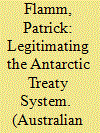

|
|
|
|
|
| Summary/Abstract |
Like other international institutions, the Antarctic Treaty System (ATS) relies on the goodwill and self-binding commitment of its members. Legitimacy, understood as the belief in the ‘rightfulness’ of a governing arrangement by its stakeholders, lies at the heart of the ATS’ success as a multilateral institution. Global warming and geopolitical power shifts are poised to challenge established forms of Antarctic legitimacy and effectiveness, with external calls for Antarctic democratisation and reform increasing. Using the concepts of input, output, and throughput legitimacy, this paper explores how the ATS has been legitimated as the only authoritative decision-making context for Antarctic matters, internally amongst Treaty Partners as well as externally towards the rest of the international community. It argues that the increase of input legitimacy through the inclusion of more consultative parties led to a perceived lack of output legitimacy for some especially environmental critics which illustrates the importance but also the limits of maintaining consensus about throughput legitimacy: the agreed upon processes and rules of decision-making. Finally, the analysis problematises the inhibiting centrality of nation states and the logic of sovereignty during times of global ecological and geopolitical change and asks how an ambitiously democratic future of Antarctic governance in the Anthropocene might look like.
|
|
|
|
|
|
|
|
|
|
|
|
|
|
|
|
| 18 |
ID:
010661


|
|
|
|
|
| Publication |
Jan 1996.
|
| Description |
63-72
|
|
|
|
|
|
|
|
|
|
|
|
|
|
|
|
| 19 |
ID:
185843
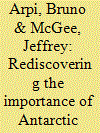

|
|
|
|
|
| Summary/Abstract |
International law provides a system of legal order for the conduct of international relations. Within this system, states may constitute regional legal regimes in a continuous geographical area to address their own regional problems. In Antarctica, states active in the region have developed a sui generis regional legal regime (conceptualised here as ‘Antarctic Law’) to address problems of the Antarctic. During most of the twentieth century, Antarctic Law played a central role in understanding human interaction within, and international ordering of, the Antarctic region. However, over the last two decades, understanding the importance of the legal and regional nature of Antarctic law has become less prominent. Instead, Antarctic scholarship (including legal analysis) has moved towards a universalist perspective, interdisciplinary scholarship and critical approaches. We argue these approaches have under-appreciated the importance of the legal ordering of the region. New challenges within the region will require responses that draw on this regional legal ordering. This paper therefore aims to be a first step towards rediscovering the importance of the concept of ‘Antarctic Law’ as a regional and legal regime with a key role in providing successful international order within the Antarctic region to meet the challenges of the early twenty-first century.
|
|
|
|
|
|
|
|
|
|
|
|
|
|
|
|
|
|
|
|
|